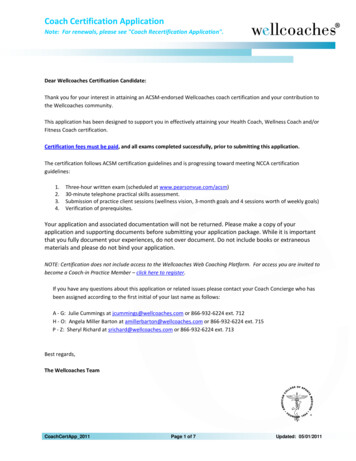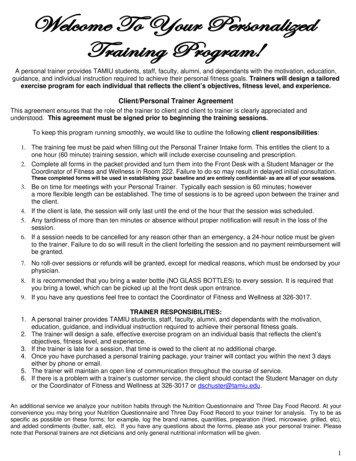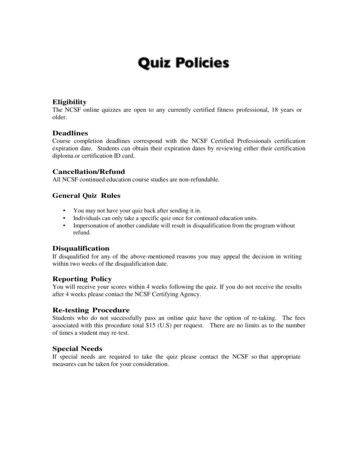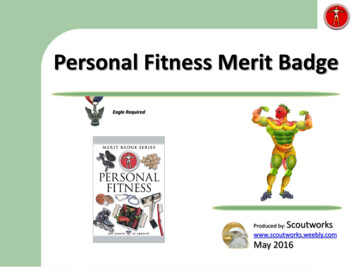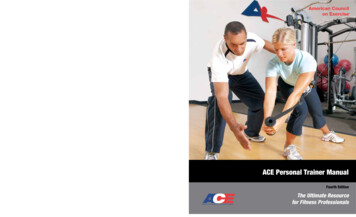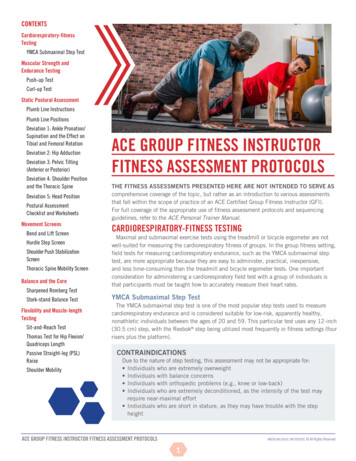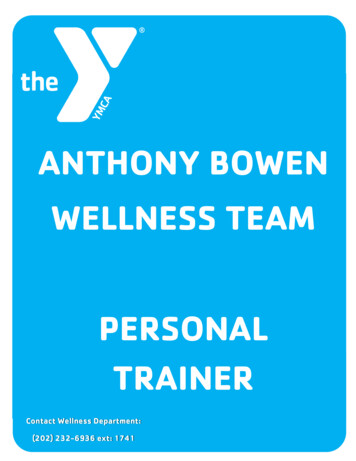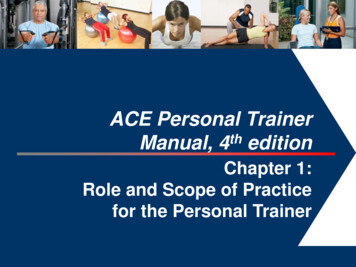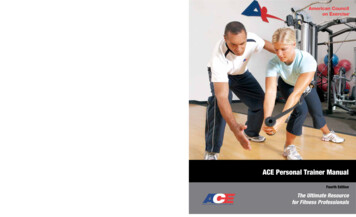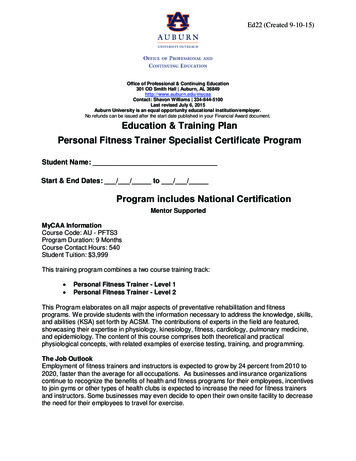
Transcription
Ed22 (Created 9-10-15)UNIVERSITY OUTREACHOFFICE OF PROFESSIONAL ANDCONTINUING EDUCATIONOffice of Professional & Continuing Education301 OD Smith Hall Auburn, AL 36849http://www.auburn.edu/mycaaContact: Shavon Williams 334-844-5100Last revised July 6, 2015Auburn University is an equal opportunity educational institution/employer.No refunds can be issued after the start date published in your Financial Award document.Education & Training PlanPersonal Fitness Trainer Specialist Certificate ProgramStudent Name:Start & End Dates: / / to / /Program includes National CertificationMentor SupportedMyCAA InformationCourse Code: AU - PFTS3Program Duration: 9 MonthsCourse Contact Hours: 540Student Tuition: 3,999This training program combines a two course training track: Personal Fitness Trainer - Level 1Personal Fitness Trainer - Level 2This Program elaborates on all major aspects of preventative rehabilitation and fitnessprograms. We provide students with the information necessary to address the knowledge, skills,and abilities (KSA) set forth by ACSM. The contributions of experts in the field are featured,showcasing their expertise in physiology, kinesiology, fitness, cardiology, pulmonary medicine,and epidemiology. The content of this course comprises both theoretical and practicalphysiological concepts, with related examples of exercise testing, training, and programming.The Job OutlookEmployment of fitness trainers and instructors is expected to grow by 24 percent from 2010 to2020, faster than the average for all occupations. As businesses and insurance organizationscontinue to recognize the benefits of health and fitness programs for their employees, incentivesto join gyms or other types of health clubs is expected to increase the need for fitness trainersand instructors. Some businesses may even decide to open their own onsite facility to decreasethe need for their employees to travel for exercise.
Ed22 (Created 9-10-15)Certification:Upon successful completion of our Personal Fitness Trainer Level 1 and 2 courses, students will beprepared for an entry-level position as a Personal Fitness Trainer in a health & fitness setting and willbe prepared to sit for the ACSM national certification exam to become a Certified Personal Trainer(CPT). The cost of this course includes the cost for taking the ACSM National Certification one time.Personal Fitness Trainer – Level 1270 HoursOverviewPersonal Fitness Trainer – Level 1 contains essential information for students interested in a career as apersonal trainer. This course provides an introduction to the profession along with coverage of exercisephysiology, biomechanics, anatomy, motor learning, and nutrition. In this Personal Fitness Trainer – Level1 course you will learn how to establish goals for clients and assess strength, flexibility, and risk as wellas develop resistance, cardiorespiratory and flexibility training programs. Learn to be a Personal Trainerand change people’s lives!After completing this course, you should be able to: Identify current trends in the field of personal trainingRecall biomechanics and nutritional needs for fitnessDefine coaching and behavior modification theoryIdentify the steps for an initial client screening and exercise program developmentRecognize the principles for starting your own business and how to address legal issuesOutlinePersonal Fitness Trainer Module 1Introduction to the Field and Profession of Personal Training The Current State of the Fitness IndustryProfessional Career EnvironmentsCore Body of KnowledgeOptions for Personal TrainersFuture Trends in the Fitness IndustryCode of Ethics for ACSM ProfessionalsCareer Track for Professional Personal TrainersBecoming a Personal TrainerAreas of SpecializationEstablishing a Client BasePersonal Fitness Trainer Module 2Anatomy, Kinesiology and Biomechanical Principles Body PositionJoint MovementMusculoskeletal AnatomyJoint Anatomy
Ed22 (Created 9-10-15) Mechanical Laws of MotionVector QuantitiesPower for Rotational MovementsMuscular Anatomy and ForceBiometrics of Selected Physical ActivitiesPersonal Fitness Trainer Module 3Exercise Physiology and Nutrition Systems of the BodyAcute ResponsesEnergy SystemsOxygen RequirementNutritional ConceptsVitamins and MineralsHydrationSpecial Food ConditionsUnderstanding a Food LabelPersonal Fitness Trainer Module 4Behavior Change and Client Focus Challenges of Behavior ChangesTranstheoretical Model (TTM)Health Belief ModelTheory of Planned BehaviorSocial Cognitive TheoryGoal Setting TheoryHelping Clients Stay ActiveSelf-EfficacyMotivationIncrease AdherencePersonal Fitness Trainer Module 5Coaching and Initial Client Consultation Active ListeningDeveloping RapportThe 5 As Model of Behavior Change CounselingMethods of CommunicationSuccessful Client RelationsRelationship MarketingPower of Nonverbal CommunicationGenerating ClientsComponents of the ConsultationClient Communication
Ed22 (Created 9-10-15)Personal Fitness Trainer Module 6Screening and Fitness Assessments The Screening ProcessRisk CategoriesExercise TestingMedical Clearance and ReferralSequence of AssessmentsHeart RateBlood PressureBody CompositionCRF AssessmentMuscular Strength AssessmentPersonal Fitness Trainer Module 7Program Design and Resistance Training Programs Physiological Benefits of an Exercise ProgramMuscular FitnessIntensity, Time, and DurationFlexibilityAnatomy of an Exercise SessionGeneral Resistance Training PrinciplesProgram Design ProcessResistance Training ModalitiesNeeds AnalysisResistance ExercisesPersonal Fitness Trainer Module 8Cardiorespiratory and Flexibility Programs General Training PrinciplesCardiovascular EnduranceBenefits and Risk of Flexibility TrainingEvaluating FlexibilityThree Types of StretchingStatic and DynamicRationale for Flexibility TrainingFlexibility Development ProgramPersonal Fitness Trainer Module 9Session Components and Special Populations Optimal Client CareAppropriate SequencingClient Education
Ed22 (Created 9-10-15) Client MotivationTraining StatusProgramming for ChildrenProgramming for Older AdultsClients with Health ConcernsPersonal Fitness Trainer Module 10Business Planning Basics and Legal Issues Fitness ManagementBudget and AdministrationSales and PricingProfessional StandardsLegal ResponsibilitiesLiabilityRisk Management ProgramBusiness PlanInformed ConsentMaterials:All materials are included in this course.System Requirements:Internet Connection Broadband or High-Speed - DSL, Cable, and Wireless Connections*Dial-Up internet connections will result in a diminished online experience. Classroom pages may loadslowly and viewing large audio and video files may not be possible.Hardware Requirements Processor - 2GHz Processor or HigherMemory - 1 GB RAM Minimum Recommended*While our courses are accessible through multiple mobile learning platforms, some courses may includea CD or DVD with the Textbook, so you may need access to a computer with CD-ROM or DVD Drive.PC Software Requirements Operating Systems - Windows Vista, Windows 7, Windows 8 or 8.1Microsoft Office 2007, 2010 or 2013 or a Word Processing application to save and open MicrosoftOffice formats (.doc, .docx, .xls, .xlsx, .ppt, .pptx)Internet Browsers - Google Chrome is highly recommendedo Cookies MUST be enabledo Pop-ups MUST be allowed (Pop-up Blocker disabled)Kindle Reader App is needed for many of our courses (No special equipment needed. This canbe downloaded for FREE onto your computer.)PowerPoint Viewer (if you do not have PowerPoint)
Ed22 (Created 9-10-15) Adobe PDF ReaderQuickTime, Windows Media Player &/or Real PlayerMAC Software Requirements Operating Systems - Mac OS x 10 or higher with WindowsMac office programs or a Word Processing application to save and open Microsoft Office formats(.doc, .docx, .xls, .xlsx, .ppt, .pptx)Internet Browsers- Google Chrome is highly recommendedo Cookies MUST be enabledo Pop-ups MUST be allowed (Pop-up Blocker disabled)Kindle Reader App is needed for many of our courses (No special equipment needed. This canbe downloaded for FREE onto your computer.)PowerPoint Viewer (if you do not have PowerPoint)Adobe PDF ReaderApple QuickTime Media PlayerIf your course has a CD-ROM or DVD included, you may need to have Microsoft WindowOperating Systems over Bootcamp (Bootcamp is a free download from Apple's website) orWindows setup with Parallels.**Outlines are subject to change, as courses and materials are updated.**Personal Fitness Trainer Level 2270 HoursOverviewPersonal Fitness Trainer - Level 2 prepares you to take the ACSM's certification exam. This courseelaborates on all major aspects of preventative rehabilitation and fitness programs. We provide studentswith the information necessary to address the knowledge, skills, and abilities (KSA) set forth by ACSM.The contributions of experts in the field are featured, showcasing their expertise in physiology,kinesiology, fitness, cardiology, pulmonary medicine, and epidemiology. The content of this coursecomprises both theoretical and practical physiological concepts, with related examples of exercise testing,training, and programming.After completing this course, you should be able to: Recognize the principles of physiology, nutrition and body compositionIdentify the steps to perform a health screening and fitness assessment tests and proceduresRecall the basics of exercise prescription for chronic diseases, such as pulmonary orcardiorespiratory diseaseIdentify the benefits and risks of regular exercise and maintaining a healthy weightRecite factors to consider when forming an exercise prescription for patients and populationPrerequisite: Personal Fitness Trainer - Level 1
Ed22 (Created 9-10-15)OutlinePersonal Fitness Trainer Module 1Anatomy and Exercise Physiology Functions of Body SystemsStructure and Function of JointsBiomechanicsForces in Human MovementExercise MetabolismMetabolic Response to ExerciseNutrition BasicsMajor NutrientsRecommended IntakeVitamins and MineralsPersonal Fitness Trainer Module 2Lifespan and Pathophysiology The Impact of AgingAging and Body SystemsDeconditioningEffects of Cardiovascular DiseaseTreatment of Pulmonary DiseasePrevention of Metabolic DiseaseRisk Factors for DiseasesRole of Exercise and Activity for Disease TreatmentPersonal Fitness Trainer Module 3Psychopathology, Screening and Activity Status Mental IllnessRecognizing SymptomsLegal Considerations for Exercise ProgrammingLegal Terminology and ConceptsPreparticipation Health ScreeningRisk AssessmentMedical ComplicationsChronic DiseasesHealth OutcomesPersonal Fitness Trainer Module 4Nutritional Status and Chronic Diseases Assessment of Physical ActivityDiseases and DietsObesity and Weight LossDietary Assessment
Ed22 (Created 9-10-15) Dietary IntakePsychosocial StatusIllnessesBehavior InterventionExercise TherapyPersonal Fitness Trainer Module 5Body Composition, Program Safety and Exercise Testing Stress and AnxietyHealth PsychologyClinical ApplicationsBody Composition ModelsExercise Program SafetyEmergency ProceduresPre-Exercise EvaluationsClient PreparationTesting EquipmentPersonal Fitness Trainer Module 6Fitness and Diagnostic Procedures Assessments for CardiorespiratoryReasons for Health-Related Fitness AssessmentsResting MeasurementsPrinciples of Muscular FitnessRange of MotionClinical Exercise Testing ProceduresProcedures for Cardiovascular DiseasePhysical ExaminationImaging MethodsPersonal Fitness Trainer Module 7Pulmonary Diseases, Metabolic Disease and Special Populations Obstructive Airway DiseasesRespiratory Exercise LimitationsMetabolic SyndromeRoutine Exercise TestingOccupational AssessmentClinical AssessmentRehabilitationEnvironmental ConditionsPregnancy and ChildrenElderly
Ed22 (Created 9-10-15)Personal Fitness Trainer Module 8Cardiorespiratory and Musculoskeletal Prescription ElectrocardiographyThe Conduction SystemDesigning an Exercise PrescriptionDeveloping Cardiorespiratory FitnessHistory of Resistance TrainingNeeds AnalysisChronic ProgrammingCardiorespiratory FitnessPhysiologic Adaptations to Cardiorespiratory TrainingExercise TrainingPersonal Fitness Trainer Module 9Group Exercise and Weight Management Adaptions to Resistance TrainingHealth and Fitness AdaptationsTrends in Group ExerciseInstructor ResponsibilitiesEstablishing a Healthy Weight GoalWeight Loss MethodsProper Weight LossExercise Prescription for Special PopulationsPersonal Fitness Trainer Module 10Exercise Prescription Part 1 Medical ConsiderationsInjury Risk FactorsEnvironmental ConsiderationsDisease-Specific EffectsCardiac RehabilitationExercise Prescription for Pulmonary DiseaseExercise Prescription for Patients with DiabetesEpidemiology of Diabetes MellitusManagement of DiabetesPersonal Fitness Trainer Module 11Exercise Prescription Part 2 Prescription for ComorbiditiesPrescription for Chronic DiseasesMedical ManagementPrescription for OsteoporosisBone StructureClinical ManagementPrescription for Arthritis
Ed22 (Created 9-10-15) Types of ArthritisPhysical Activity Behavior ChangePersonal Fitness Trainer Module 12Behavior Change Practical Skills for Behavior ChangeSetting GoalsShaping BehaviorsCounseling Physical ActivityMethods for Delivering Activity ProgramsHealth CommunicationsSocial MovementsPhysical Activity in CommunityFacilitating Community ChangeEvaluating Community InterventionsPersonal Fitness Trainer Module 13Benefits, Risks and Assessments Physical Activity and Fitness TerminologyBenefits of Regular ExerciseExercise RisksPreparticipation Health ScreeningInitiating Physical ActivityPreexercise EvaluationMedical HistoryPhysical Fitness Testing and InterpretationBody CompositionMuscular Strength and EndurancePersonal Fitness Trainer Module 14Clinical Exercise Testing and Principles of Exercise Prescription Measurements During Exercise TestingImaging ModalitiesExercise Testing as a Screening ToolDiagnostic Value of Exercise TestingConsiderations for Exercise PrescriptionComponents of the Exercise Training SessionMuscular FitnessFlexibility ExerciseSpecial PopulationsEnvironmental Considerations
Ed22 (Created 9-10-15)Personal Fitness Trainer Module 15Exercise Prescription for Patients, Populations and Behavioral Theories Cardiovascular and Cerebrovascular DiseaseChronic DiseasesHealth ConditionsSpecial ConsiderationsStrategies to Promote ExerciseTheoretical FoundationsBehavior/Increase AdherenceSpecial PopulationsMaterials:All materials are included in this course.Certifications:Upon successful completion of our Personal Fitness Trainer Level 1 and Level 2 courses, students will beprepared to sit for the ACSM national certification exam to becomea Certified Personal Trainer (CPT).System Requirements:Internet Connection Broadband or High-Speed - DSL, Cable, and Wireless Connections*Dial-Up internet connections will result in a diminished online experience. Classroom pages may loadslowly and viewing large audio and video files may not be possible.Hardware Requirements Processor - 2GHz Processor or HigherMemory - 1 GB RAM Minimum Recommended*While our courses are accessible through multiple mobile learning platforms, some courses may includea CD or DVD with the Textbook, so you may need access to a computer with CD-ROM or DVD Drive.PC Software Requirements Operating Systems - Windows Vista, Windows 7, Windows 8 or 8.1Microsoft Office 2007, 2010 or 2013 or a Word Processing application to save and open MicrosoftOffice formats (.doc, .docx, .xls, .xlsx, .ppt, .pptx)Internet Browsers - Google Chrome is highly recommendedo Cookies MUST be enabledo Pop-ups MUST be allowed (Pop-up Blocker disabled)Kindle Reader App is needed for many of our courses (No special equipment needed. This canbe downloaded for FREE onto your computer.)
Ed22 (Created 9-10-15) PowerPoint Viewer (if you do not have PowerPoint)Adobe PDF ReaderQuickTime, Windows Media Player &/or Real PlayerMAC Software Requirements Operating Systems - Mac OS x 10 or higher with WindowsMac office programs or a Word Processing application to save and open Microsoft Office formats(.doc, .docx, .xls, .xlsx, .ppt, .pptx)Internet Browsers- Google Chrome is highly recommendedo Cookies MUST be enabledo Pop-ups MUST be allowed (Pop-up Blocker disabled)Kindle Reader App is needed for many of our courses (No special equipment needed. This canbe downloaded for FREE onto your computer.)PowerPoint Viewer (if you do not have PowerPoint)Adobe PDF ReaderApple QuickTime Media PlayerIf your course has a CD-ROM or DVD included, you --may need to have Microsoft WindowOperating Systems over Bootcamp (Bootcamp is a free download from Apple's website) orWindows setup with Parallels.**Outlines are subject to change, as courses and materials are updated.**
Personal Fitness Trainer – Level 1 contains essential information for students interested in a career as a personal trainer. This course provides an introduction to the profession along with coverage of exercise physiology, biomechanics, anatomy, motor learning, and nutrition. In this P
